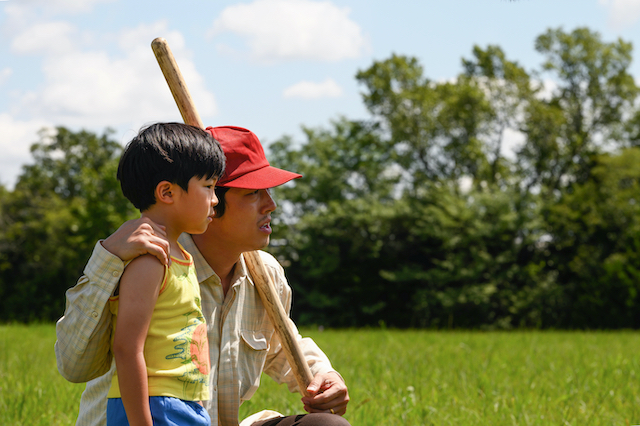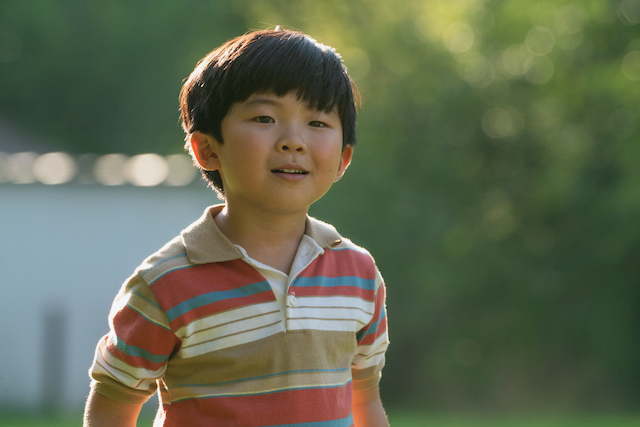Minari is a semi-autobiographical narrative based on director Lee Isaac Chung’s childhood experience. It tells the story of a Korean immigrant father striving to succeed in America while his wife strains to keep their family together. In the midst of the struggle for a better life, two children watch and learn and grow.
Chung’s counterpart in the movie, seven-year-old David (Alan Kim), follows his parents Jacob Yi (Steven Yeun) and Monica (Yeri Han), together with his older sister Anne (Noel Kate Cho), to relocate from California to rural Arkansas in the 1980’s. Driven by the ambition to be successful, especially in the eyes of his children, Jacob has purchased 50 acres of land to start a farm growing Korean produce. With the influx of Korean immigrants coming into the country during that time, Jacob sees a wealth of opportunity.
Jacob and Monica still hold a day job at a hatchery doing chicken sexing, separating the male chicks from the female, but Jacob sees no future in the routine work. The farm is his dream. In the sexing process, the male chicks are discarded, for they don’t taste as good and can’t lay eggs. A ready object lesson for him to teach his young son: be useful. And when he digs a well, he dismisses the dowsing method offered to him. “Koreans use their heads,” he tells David.
Monica, however, sees a very different picture. The dream home in the country for Jacob is for her, realistically, a trailer on wheels held up by cinder blocks. Water is from a well which later is drained dry to the crops. There’s no community nearby. Her main concern is living far from a hospital as David has a life-threatening heart murmur. “Don’t forget to keep praying,” she tells David. The couple’s opposing views lead to frequent conflicts in front of the children.
The tipping point comes when Monica’s mother is recruited to help with the kids. Arriving from Korea, Grandma Soonja (Youn Yuh-jung) brings with her Korean spices and rarity not found in America, as well as Korean songs, memory of courtship that has long been buried by her daughter and son-in-law.
For David, Grandma is far from what he has expected. She is a raucous card player, swears, doesn’t cook or bake, uses half his room and, aggravating his annoyance, snores. The interplay between grandma and grandson make up some light-hearted scenes which elicit from Kim performance in his natural poise alongside the veteran, seasoned Youn. The key element in their eventual bonding is love. Kudos to Chung for his screenplay and directing.
Another supporting role that has added spice to the film is Paul (Will Patton), a practical farm help to Jacob. A devout Pentecostal, Paul’s eccentricity is a laughing stock even with church kids. Jacob does not subscribe to his beliefs. Admirably, the two can still work in harmony.
Premiered at the 2020 Sundance Film Festival and winning both its Audience Award and the Grand Jury Prize, Minari has come a long way this past year garnering accolades. The film is now an Oscar nominee in six categories including Best Picture, Best Director and Original Screenplay for Chung. Yeun becomes the first actor of Asian descent to be nominated for Best Actor. Youn gets a nod for Best Supporting Actress and composer Emile Mosseri for Best Original Score.
Compared to his acclaimed debut feature Munyurangabo (2007), an arthouse, experimental film about two youths in post-genocide Rwanda, Minari is a conventional take on a personal, family story. The storytelling is linear and captured in realism, as we follow the Yi family’s first arrival to rural Arkansas and the daily struggles as an immigrant, farm family. The film’s subject matter and Chung’s handling is deceivingly simple.
Thanks to the eponymous vegetable, the minari, Lee transfers the specific to a wider scope in different layers. Minari is a Korean watercress that grows hardily in wet soil. Grandma has brought some minari seeds with her from Korea and sows them beside the creek near their home. As days go by, the plants thrive on their own, an apt metaphor for the resilience and adaptability of immigrants taking roots in a new soil.
In contrast to a grim lesson of discarding the male chicks at the hatchery David learns from his father, the minari along the creek is a visual reminder of being alive and useful. Grandma sings its praises, for the versatile vegetable can be put in kimchi, stew, and soup, and used as medicine when sick. “Minari, Wonderful.” Grandma and David burst out in an impromptu song. A delightful scene is captured by the camera. As the wind blows, the plants bow as if acknowledging their praises. A moment of magical realism.
As time goes by, the minari plants thrive, and David’s heart condition has improved on its own such that surgery is no longer needed. In the climactic scene and its fallout, a contrast is particularly notable. Jacob sweats and labors on his crops which can be gone in an instant, but the minari grows naturally in the wild and David’s illness healed, pointing to a harvest of transcending grace that is beyond human efforts. The denouement is a gratifying close to a chapter of childhood memory.
~ ~ ~ 1/2 Ripples
***
I thank Asian American Press for allowing me to post my review here in full.

